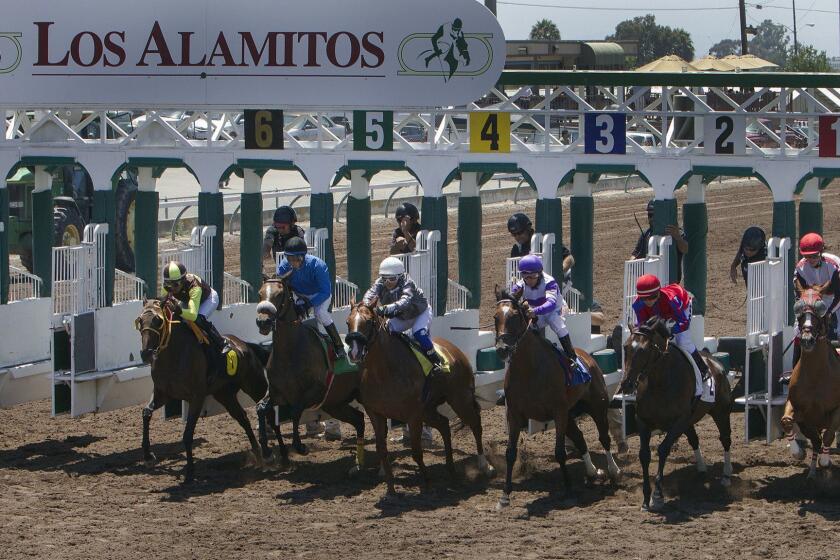Two groups want to ban sale of racehorses to South Korean interests

- Share via
The unlikely alliance of a racetrack owner and an animal rights advocacy group is calling for the end of North American horses being sold to South Korean interests for the purpose of racing or breeding. The Stronach Group, owner of Santa Anita and Golden Gate Fields, joined People for the Ethical Treatment of Animals in calling for this action after a 2006 Kentucky Derby runner was sent to a South Korean slaughterhouse after his breeding career was over.
It was learned through public records that Private Vow, a 17-year-old who finished 15th in the Kentucky Derby, was killed on July 22 this year, likely to be used for either pet food or rendered into another byproduct. In addition, two 4-year-old horses who Private Vow sired — Normal Classic and Private Man — were also killed in a slaughterhouse this year and two of his 3-year-old fillies — Private Castle and Up Quibit — were killed last year, according to information obtained by PETA from multiple Korean databases.
The last horse slaughterhouses in the United States were closed in 2007, although horses are trucked across borders to Mexico and Canada, where slaughtering them is legal.
In California, it is a felony to sell, send or take a horse to someone who would transport it across borders to a slaughterhouse. The California Horse Racing Board has actively encouraged people to bring such violations to the attention of authorities.
The Stronach Group had previously adopted a policy that horses from its previously owned Adena Springs breeding facilities could not be sent to South Korea. Adena Springs is no longer a part of the Stronach Group and now belongs to Frank Stronach, who obtained the breeding part of the company as part of a settlement resulting from litigation with his daughter, Belinda Stronach, chief executive of the Stronach Group, and others at TSG.
“The Stronach Group is urging all North American auction companies, breeders and owners to develop policies that prohibit the sale of thoroughbred racehorses or brood mares to South Korea without the meaningful and binding assurances that these noble animals will be protected after their racing and breeding careers,” Belinda Stronach said.
We’ve got the first week of stewards’ rulings for the L.A. County Fair meeting at Los Alamitos.
Both groups seek more stringent efforts for improving aftercare programs for horses in South Korea, in part by allocating 2% of purse money to aftercare. It’s also an issue in the United States, although a lot of independent groups and regulators put forth measures to find homes for retired and pensioned horses. A horse is pensioned when it is no longer available for breeding.
According to the stallion directory in the Korean Stud Book, 61 of the 106 stallions in the country have been imported from the United States, including Shackelford, winner of 2011 Preakness Stakes, and Colonel John, winner of the 2008 Santa Anita Derby.
Private Vow started his 2-year-old career by winning three of four races, including the Grade 2 Futurity Stakes at Belmont Park. He later won the Grade 2 Kentucky Jockey Club Stakes and was third in the Arkansas Derby. He was later retired from racing in January of his 4-year-old career after winning four of 12 races and $491,312 in purses. He was trained in the Kentucky Derby by Steve Asmussen, and his last trainer was Scott Blasi. He had been ridden by Mike Smith, Jerry Bailey and John Velazquez, all Hall of Fame jockeys.
He was sold to Red River Farms for his stallion career in 2008 and was resold to a Korean interest in 2014.
The impetus in moving the horse to South Korea was likely because he has the same sire (Broken Vow) as Dongbanui Gangja, a two-time winner of the Grand Prix Stakes, a prestigious Korean race. He is believed to have sired 196 foals in both countries, a low number by today’s standards.
A PETA investigation in 2018-2019 first brought to light the killing of racehorses in Korean slaughterhouses, leading to minor reforms.
It is the not the first time that the Stronach Group and PETA have been on the same side. PETA came up with the idea to allow bettors to contribute to aftercare programs while using self-service betting machines, which was endorsed and implemented at Stronach tracks and, subsequently, by other jurisdictions. During the spike in fatalities at Santa Anita last year, PETA joined with Belinda Stronach in endorsing a series of safety reform measures.
While PETA is often a synonym for all animal rights groups, its public stances are more moderate than many animal rights’ coalitions. Its stated goal is not to shut down racing but make things as safe as possible for the horses. However, it has, at times, called for the closure of tracks, including Santa Anita, and the banning of trainers.
More to Read
Go beyond the scoreboard
Get the latest on L.A.'s teams in the daily Sports Report newsletter.
You may occasionally receive promotional content from the Los Angeles Times.












